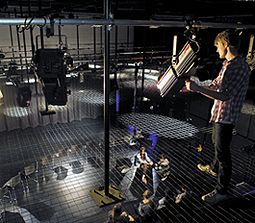New pathway for international art and design students launched with Cambridge Education Group
Release Date 06 September 2016

International students wanting to study creative arts in the UK will be able to benefit from a new partnership between the University of Reading and the Cambridge Education Group (CEG), announced today.
From September 2017, a new ‘ONCAMPUS’ Reading centre will offer international students an Undergraduate Foundation Programme (UFP) with guaranteed progression for successful students to a range of the University of Reading’s Arts and Design courses.
The UFP is designed to offer high-quality teaching that is tailored to the needs of international students, ensuring that they are ideally prepared to be successful on their chosen degree programme.
Lord Chris Patten, Chancellor of Oxford University, who spoke at the launch event, said: “I think we underestimate the importance of education as the most important humanising experience in our lives and I think we understate the role of education in creating some of the glue which holds our societies and indeed our international communities together.”
Sir David Bell, Vice-Chancellor of the University of Reading said:
“I am delighted by the opportunities this new collaboration that ONCAMPUS will help to create. As well providing a specialist pathway for international art and design students here at the University of Reading, we look forward to a fruitful partnership with Cambridge Education Group for future global excellence in the sector.”
ONCAMPUS Reading students will progress to degrees in the University of Reading’s School of Arts and Communication Design, which is home to a vibrant 24-hour studio community with state-of-the-art facilities, well-equipped studio space, a student-run gallery and commercial student-supported design and print studio.